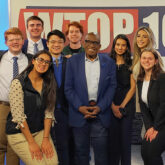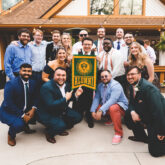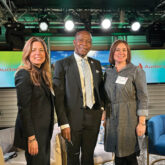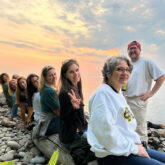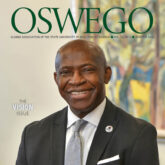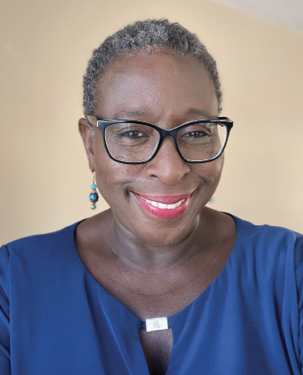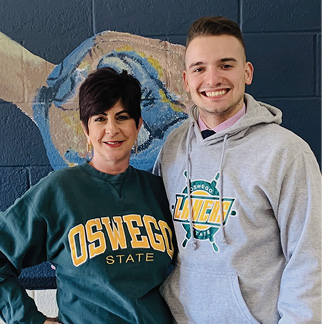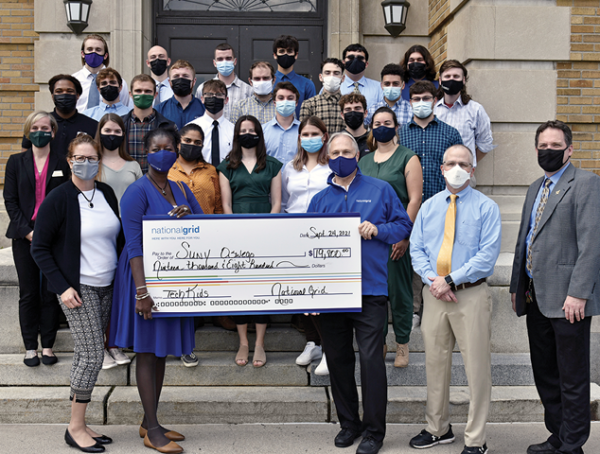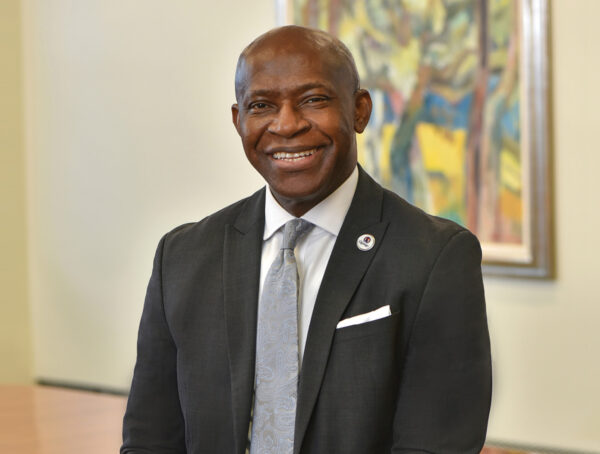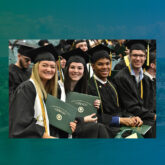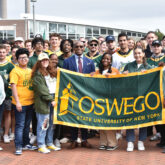Yvonne Spicer ’84, M ’85 loves changing minds.
So when skeptical teachers walk away from her institutes inspired, it inspires her. That’s how she knows her mission to elevate high technology in American classrooms is headed in the right direction.
Without a greater science, technology, engineering and math presence in everyday education, our kids can’t compete, Spicer says.
But, technology doesn’t just mean the latest electronic gadgets. “It’s understanding the world around you,” says Spicer, vice president of advocacy and educational partnerships for the National Center for Technological Literacy at Boston’s Museum of Science.
That’s why all Americans need a better understanding of this important part of modern life.
“This is about re-educating and re-indoctrinating ourselves in the 21st century,” Spicer says. “We’re not producing the knowledge for high-paying high-tech jobs.
“It’s really about being a competitive citizen in this world,” she says. “I don’t think our kids have been very well prepared [to be] that.”
Planting the Seeds of STEM
A former teacher and administrator, Spicer knows the process begins in the schools. So, five years ago she joined the fledgling National Center for Technological Literacy, which aims to expand the influence of engineering and technology in classrooms coast to coast.
“There is no question that kids either get inspired or turned off by something in elementary school,” she says.
Spicer also believes mentors make all the difference in the lower grades, particularly for young women. It’s a role she cherishes and has embraced since her days as a student teacher and a Big Sister volunteering through her Omega Delta Phi sorority.
Teachers can be powerful role models and single-sex education for STEM courses in public schools could be one way to attract more women and minorities to technological professions, Spicer says. In the meantime, she believes better teacher training and outreach to parents will make a difference.
MORE: Three things you can do to make your kids more tech savvy
Of course, not every child can or will be an engineer. But everyone can benefit from the critical thinking and problem solving that define the engineering discipline, she explains.
Taking Science on the Road
The NCTL, which is housed at the Museum of Science, Boston, has a goal to reach out to schools and establish at least one science center or informal education organization in every state by 2015. No wonder Spicer spends a majority of her time on the road, linking schools with colleges and other educational partners, speaking at conferences, or leading workshops.
“I absolutely love this work and I feel it’s making a difference across this country,” says Spicer, who is a member of the Massachusetts Governor’s STEM Advisory Council and the North America Advisory Board for the AcrossWorld Education advocacy organization. She was named a “Woman to Watch,” by the Massachusetts High Technology Council in 2009.
In January, she was named a member of a new STEM advisory committee formed by the National Governors Association Center for Best Practices to help governors develop statewide STEM agendas.
One of Spicer’s most successful programs to date is the Gateway Project, which includes a three-day institute that gathers a cross section of school personnel and districts for intense STEM training they can take back home.
“This is the backbone of what we do,” Spicer says. A program key is follow-up visits that ensure Gateway plans are followed.
Some 65 districts and 300 educators in Massachusetts have participated and the program is expanding to Maine and Texas.
Some workshop-weary teachers are not always eager to partake in the program, Spicer says. But more often than not, they become her leading advocates by the time they leave.
Changing Minds
The Gateway Project works with a mix of rural, suburban and urban districts. Addressing the critical issue of improving inner city education really resonates with Spicer.
“I look at the journey I’ve had and everything I have done has prepared me for this career,” she says.
Spicer was born and raised in Brooklyn by parents who had never set foot in a high school. They understood the importance of a good education, though, and saw all four of their children attend college.
Spicer was an exceptional student, attending Brooklyn Tech and studying architecture. She came to Oswego under a federal program supporting college-bound inner city youth.
As an African American woman in the technology field, Spicer knows about the hurdles women and minorities face in science.
At Oswego, she was one of only three females in the entire technology education program. She was the only woman of color.
“I owe [the program] a debt of gratitude because they never told me I couldn’t do it and I always felt comfortable in that space,” says Spicer, who was particularly inspired by Professor John Belt and Professors Emeriti Ronald Sorensen and Dave Faux.
“Oswego taught me you can do anything and be anywhere and be comfortable with who you are,” Spicer says.
It’s a lesson she lives and shares on her mission to change minds every day.
You might also like
More from Featured Content
Vision for the Future
VISION for the Future Peter O. Nwosu began his tenure as the 11th president of SUNY Oswego, building on the solid …
Envisioning the Potential in All Students
ENVISIONING the Potential in All Students Educator donates $2 million in recognition of his Oswego education, in support of future teachers Frank …
A Vision of Support
A VISION of Support Award-winning principal makes an impact on her school through her positivity and commitment When Nicole Knapp Ey ’02 …


